It’s difficult to catch these guys off guard, but even Todd Rogers and Phil Dalhausser can stop in their tracks on occasion.
On Aug. 22, 2008, the two stepped onto the court in Beijing and faced a team they had defeated only once in six tries. Now the Olympic gold medal was at stake.
To employ some editorial license, their reaction to the anniversary could be paraphrased simply.
“It seems like forever, but I remember it like yesterday,” they’d say.
After a flurry of blocks by Dalhausser in the third set, the Americans had scored a 23-21, 17-21, 15-4 victory over Marcio Araujo and Fabio Magalhaes of Brazil, putting the final stamp of validation on a partnership that began only a year and a half before they arrived in China.
When the final ball hit the sand, Dalhausser and Rogers looked as stunned as anyone.
“When Phil stuffed that ball, it starts that celebration and then nothing goes through my mind and Phil is charging me and I say, ‘Oh gosh. He’s going to take me out.’ He was kind of enough to break the fall,” Rogers said with a laugh.
It took a moment for Dalhausser to get that far. His immediate thought:
“Holy (cow), we just won gold. Are you crazy?”
It actually wasn’t that crazy. Since they began as a team at the outset of the 2006 season, they began blistering the world, not to mention the AVP Tour.
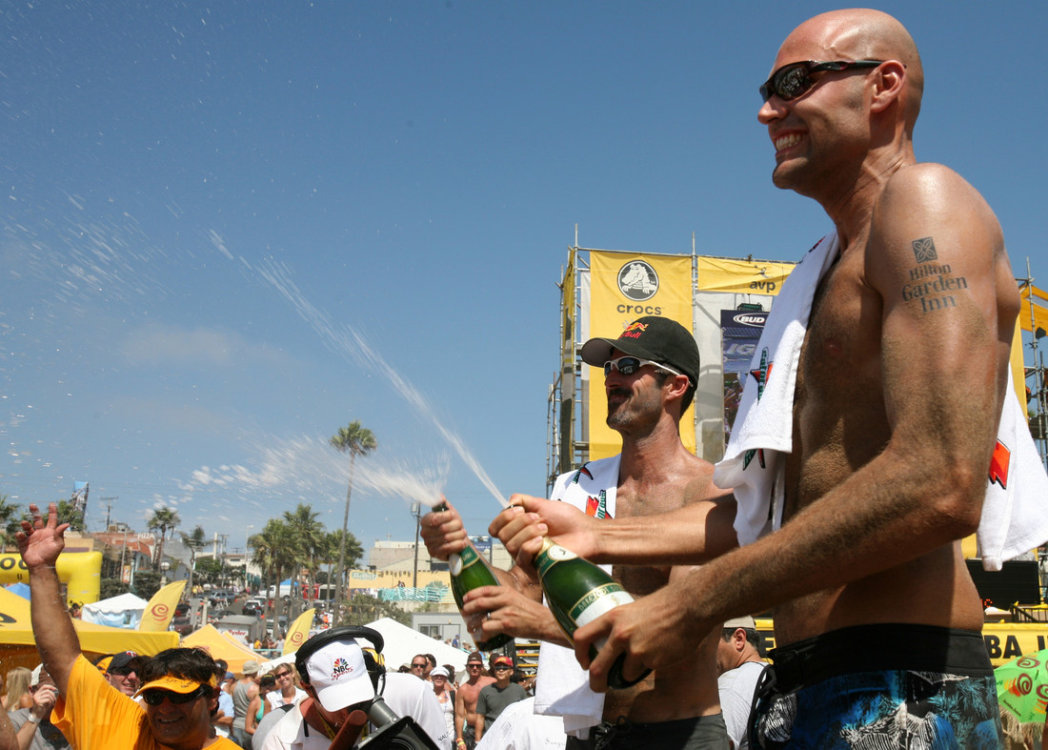
They were the second-fastest team to capture their 100th international victory as a team (in 124 tournaments) behind Brazilians Emanuel Rego and Ricardo Santos (100-19), who were the defending Olympic gold medalists at the time.
In 2007, Dalhausser and Rogers were 80-11 on the AVP, then won eight of the ten tournaments they played prior to the Olympics in 2008. On the FIVB World Tour, they won the three events prior to Beijing in Paris, Stavanger (Norway) and Moscow.
They won so often that they remember the sting of losing in the Berlin final before that run better than they do the subsequent three titles.
“The run-up, I remember taking the second— in fact, believe it or not, I remember taking the second in Germany moreso than I remember the three wins just because the final was against Emanuel and Ricardo in an extremely high-level game, probably the highest I’ve ever played in by all four athletes,” Rogers said. “We ended up losing 15-13 in the third. I remember Matt Fuerbringer saying that’s the last time he saw Phil being the worst player on the court.”
In other words, they were on a roll. They took some time off and arrived in China about five days before the start of competition, but just in time to participate in the Opening Ceremonies.
However, the joy of their first Olympiad came with a cost.
“People had warned us about that,” Rogers said. “I took it a little more to heart than Phil. Myself, Jake (Gibb) and Nicole Branagh all figured out a way to walk the whole ceremony and then bolt through a side door before you go out to the center field. A lot of people said ‘It’s hot, it’s going to be really humid, you’re dressed in long sleeves and a jacket and you can’t take it off.’ I wanted to get out of there, I didn’t want to stay there for three hours, so I jetted out.”
Their first match the next day was against Latvians Martins Plavins and Aleksandrs Samoilovs. The Americans were dusted in two sets.
“We went to walk in the Olympic ceremonies all day long, you’re on your feet and my legs were just toast the next day,” Dalhausser said. “Latvia was hungry that night and they beat us.”
It was pool play, but after two victories, Dalhausser and Rogers suddenly found themselves in the bracket opposite of Fabio/Marcio and Emanuel/Ricardo.
In the first elimination match, they rolled past the Swiss team of Patrick Heuscher and Sascha Heyer, then found themselves in a three-set tussle with another Swiss team, Martin Laciga and Jan Schnider.
In the third set, Dalhausser and Rogers had to confront a 6-0 deficit. From that point the Americans have the memory of an elephant with artificial intelligence capabilities.
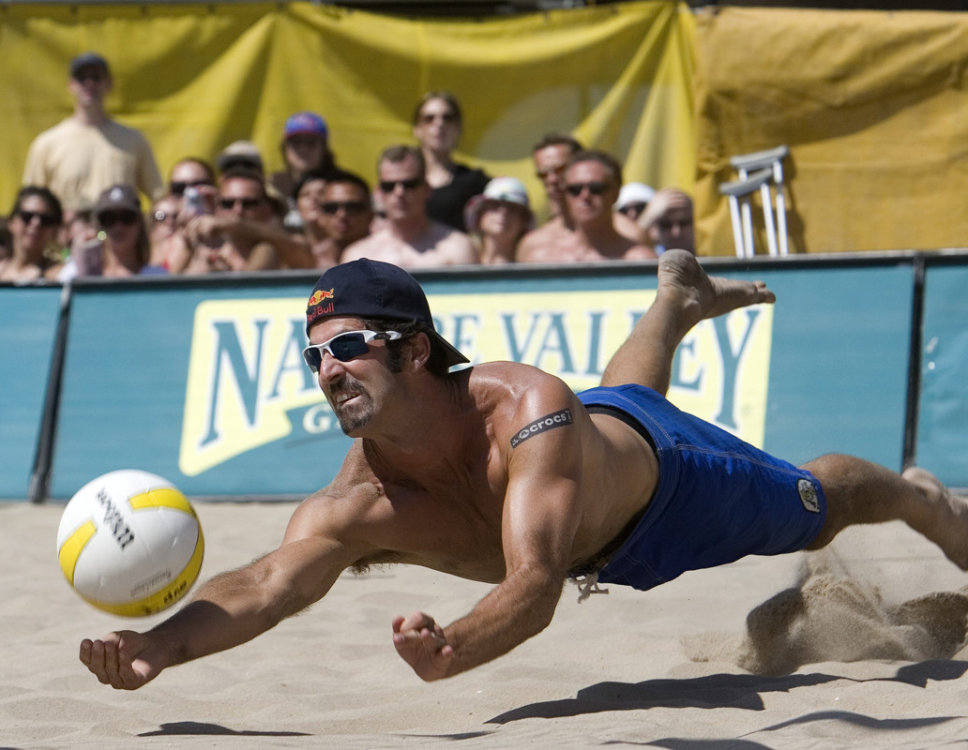
“It was the oddest thing,” Rogers said. “At 6-0, I’m like ‘We’re screwed.’ It was one of those things where well, there’s nothing we can do. They were on-the-line serves and Phil couldn’t get them. We came back from timeout, got the sideout, he gets a stuff and Martin Laciga literally lost his mind. The left-sider (Schnider) actually hit a ball sharp-angle and it was out by inch, maybe nothing.
“I thought it was a pretty good hit, all things given and at 6-1 that’s not exactly the worst thing to do, let’s go for the dagger now and he hits it out and Laciga throws his arms up and is going nuts on his partner. It was clearly out, it wasn’t that close you could argue the call.
“But he storms over to the bench and I’m sitting there and Phil and I are looking at each other and saying ‘Dude, he’s losing his mind.’ The thought entered our head that ‘We’ve got this.’ If he’s going to act like this, all we’ve got to do is keep steady and let his partner make an error or two, let’s keep the ball on his partner and sure enough we got it back to 6-5 and then it became a sideout battle and we picked up a point here and there.”
“We were down 6-0 in the third set, we finally sided out, and I got a block and made it 6-2 and Martin Laciga freaked out and called a timeout over one point,” Dalhausser said. “That timeout switched the momentum in our favor and I think we went up 8-7, something close around there, and we actually had a sideout to win at 14-13. Laciga found a serve around my middle and I just got it up and Todd put it up, I don’t know, around 10 feet off, I just put it in and Laciga hit – I remember this like it was yesterday – chop and the angle, angle, he dug, I hand-set (Todd), he hit a cut shot that went in and boom.”
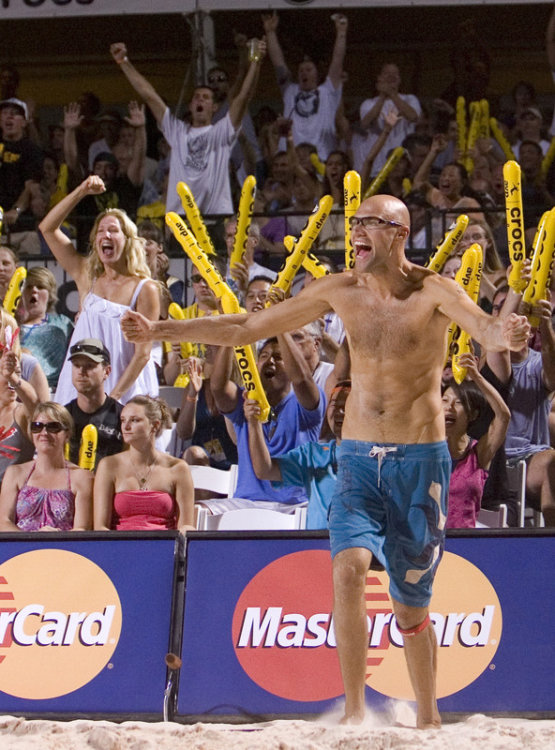
Boom, in this reference, was another block by Dalhausser to end it.
Two victories followed before Dalhausser and Rogers could play for the gold, where their good friends Fabio and Marcio were waiting after they had defeated Emanuel and Ricardo in the semifinals.
Rogers and Dalhausser won the first set, 23-21, before Fabio and Marcio took the second, 21-17.
Then came a few more booms.
“I felt like I was on Fabio,” the 6-foot-9 Dalhausser said. “I know I can get on this guy, and yep. He’s very predictable. We were in control of the second set and Marcio went on a run with his serve and that was the difference in the second set. And Fabio kept hitting the same ball over and over and didn’t shoot once and when he did finally, it was 13-3 or whatever it was, and he hit his cut shot out.
“I was just in a zone. Everything was moving so slowly.”
Not a lot Rogers could do but stand back and enjoy.
“It was interesting because he kept whaling away at it on the same spot, just boom, boom, boom, boom and not mixing it up,” the 6-foot-2 Rogers said. “We kept thinking he was going to mix it up and he didn’t, so we’re going to keep doing the same thing until he mixes it up and he never did.
“Phil was kind of in a zone there. I’ve seen it happen many times, with me as a blocker way, way back in the day.”
Suddenly, it’s 15-4. Game, set, match, Gold.
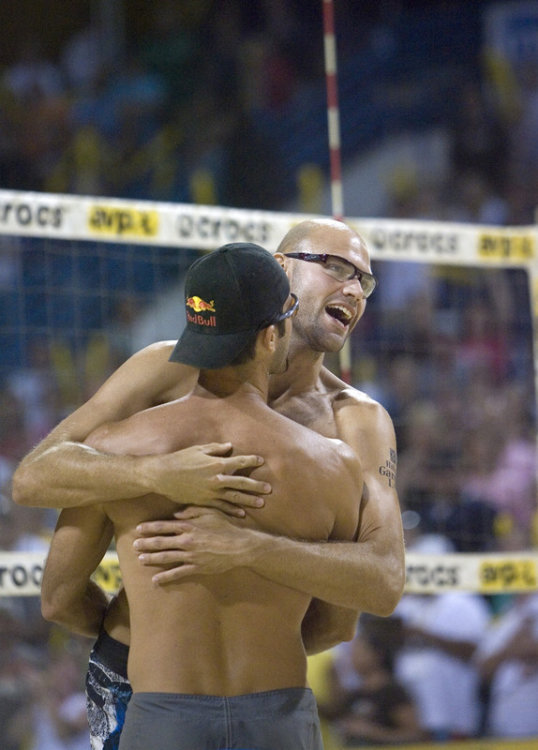
“I’m not super-demonstrative,” Rogers said, “but in that moment, it’s a three-year journey from October or November of 2005 having messaged Phil and saying ‘Hey, I think you could be the best player in the world and I want to make a run at the Olympics and I’d like to do it with you, and see if we can get to the Olympics and then when we get there, maybe we can win a gold medal.’
“I’d love to say there was an epiphany or whatnot but there was nothing going through my mind but euphoria. So many beach workouts, track workouts.
“Looking back now 11 years after the fact, that’s kind of what I’m most proud of, not so much the moment itself but the work we put in. We did put in a lot of work to put ourselves in a position to be there to win a gold medal for the States, the fans and ourselves.
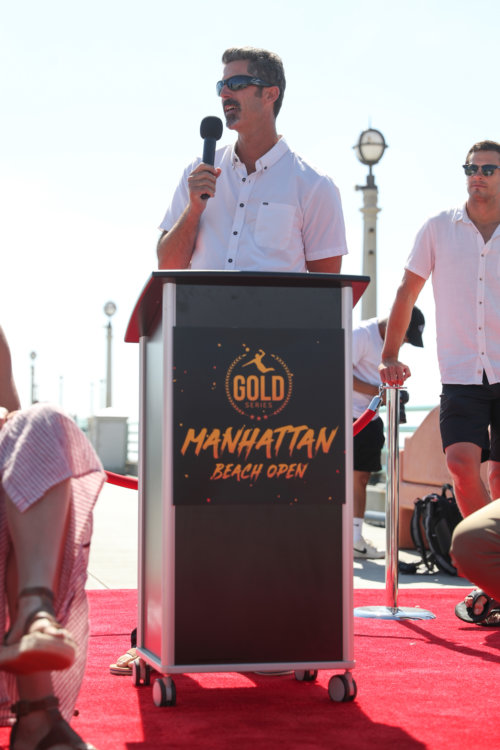
It also solidified a legacy for The Professor and the Thin Beast.
“I compare it to an NFL quarterback winning a Super Bowl,” Dalhausser said. “You don’t have that Super Bowl ring, then your career is not complete, so it’s the same kind of thing.”
“I would absolutely agree, at least in the modern era,” Rogers said. “There were some fantastic players in the 80s, 70s, 60s that were superstars in their era but nowadays if you’re lacking a gold medal and you’re a really good player with a lot of wins but without that, you’re probably not going to be considered one of the greatest of the current era.”
Dalhausser and Rogers will have that distinction forever.